|
De Noorse schrijver Johan Harstad werd geboren op 10 februari 1979 in Stavanger. Zie ook alle tags voor Johan Harstad op dit blog.
Uit: 172 Hours on the Moon
“That’s the stupidest thing I’ve ever heard,” Mia Nomeland said, giving her parents an unenthusiastic look. “No way.”
“But Mia, honey. It’s an amazing opportunity, don’t you think?”
Her parents were sitting side by side on the sofa, as if glued together, with the ad they had clipped out of the newspaper lying on the coffee table in front of them. Every last corner of the world had already had a chance to see some version of it. The campaign had been running for weeks on TV, the radio, the Internet, and in the papers, and the name NASA was on its way to becoming as well known around the globe as Coca-Cola or McDonald’s.
“An opportunity for what? To make a fool of myself?”
“Won’t you even consider it?” her mother tried. “The deadline isn’t for a month, you know.”
“No! I don’t want to consider it. There’s nothing for me to do up there. There’s something for me to do absolutely everywhere except on the moon.”
“If it were me, I would have applied on the spot,” her mother said.
“Well, I’m sure my friends and I are all very glad that you’re not me.”
“Mia!”
“Fine, sorry. It’s just that I . . . I don’t care. Is that so hard for you to understand? You guys are always telling me that the world is full of opportunities and that you have to choose some and let others pass you by. And that there are enough opportunities to last a lifetime and then some. Right, Dad?”
Her dad mumbled some sort of response and looked the other way.
Her mother sighed. “I’ll leave the ad over here on the piano for a while, in case you change your mind.”
It’s always like this, Mia thought, leaving the living room. They’re not listening. They’re just waiting for me to finish talking.”
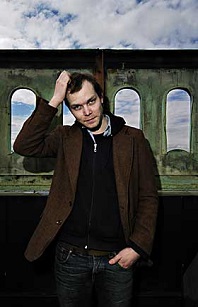
Johan Harstad (Stavanger, 10 februari 1979)
De Noorse schrijfster en journaliste Åsne Seierstad werd geboren in Oslo op 10 februari 1970. Zie ook alle tags voor Åsne Seierstad op dit blog.
Uit: The Bookseller of Kabul (Vertaald door Ingrid Christophersen)
„Not a sound escaped Sonya's lips. With tearful eyes and bowed head, she hid behind her long shawl.
"Your parents have accepted the suitor," her uncle said. "Now is your only chance to express an opinion."
She was petrified, paralyzed by fear. She did not want the man but she knew she had to obey her parents. As Sultan's wife, her standing in Afghan society would go up considerably. The bride money would solve many of her family's problems. The money would help her parents buy good wives for their sons.
Sonya held her tongue, and with that her fate was sealed. To say nothing means to give one's consent. The agreement was drawn up, the date fixed.
Sultan went home to inform his family of the news. His wife, Sharifa, his mother, and his sisters were seated around a dish of rice and spinach. Sharifa thought he was joking and laughed and cracked some jokes in return. His mother too laughed at Sultan's joke. She could not believe that he had entered into a proposal of marriage without her blessing. The sisters were dumbfounded.
No one believed him, not until he showed them the kerchief and sweetmeats the parents of a bride give the suitor as proof of the engagement.”
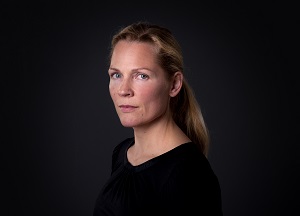
Åsne Seierstad (Oslo, 10 februari 1970)
De Nederlandse dichteres, schrijfster en theatermaakster Marjolijn (barones) van Heemstra werd geboren in Amsterdam op 10 februari 1981. Zie ook alle tags voor Marjolijn van Heemstra op dit blog.
Duivenmelker
Mijn vriend, mijn duivenmelker, zijn hart een til
vol tortels, smal en van een bruin soort grijs, ’s nachts
koeren ze in zijn borst zoals het vroeger koerde
in de sleedoorn: dat het goed was, er een boom was,
een hoger, houten wezen. In zijn ogen kraalt de belofte
van terugkeer en ik weet
als wij wind verliezen, met de dieren stranden
in de wildernis van water, noord noch zuid en alles
roerloos, als de apen om bananen schreeuwen
en de tijgers om hun vlees, het mijne, dan opent hij
zijn borst, vliegt een van zijn duiven
uit over het sop
en komt terug met bewijs
van een boom, van aarde
maakt van dit zwerven varen
met bestemming land.
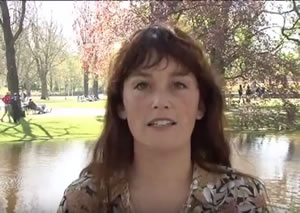
Marjolijn van Heemstra (Amsterdam, 10 februari 1981)
De Nederlandse dichter en schrijver Jacob (Jac.) van Hattum werd geboren in Wommels op 10 februari 1900. Zie ook alle tags voor Jac. Van Hattum op dit blog.
Geen dag kan zo beginnen
Geen dag kan zo beginnen,
als deze dag begon;
ik kwam mijn kamer binnen
en daar was enkel zon.
De klok was staan gebleven,
maar ik vroeg naar geen uur;
de tijd was opgeheven,
daar was slechts licht en duur.
En duur en licht en luister;
de winter was voorbij;
in rouwfloers sloop het duister
en vluchtte weg van mij.
De zon op drup en perel,
viel over knop en tak;
en voor me zong de merel
op buurmans pannendak.
Geen dag kan zo beginnen,
als deze dag begon:
ik kwam mijn kamer binnen
en daar was enkel zon.
Kwatrijnen
Lyriek wordt epiek onder één beding:
noem namen: weg valt de betoovering;
men spot: ‘Hij weent...’ - en alle vingers wijzen;
zoo spotlacht Gij, die weet, dat ik U bezing.
*
Tusschen Uw ‘hier-zijn’ en Uw ‘weder-komen’
lig ik, dorstende, gebonden, tusschen stroomen,
waarvan ik droomde, dat ik drinkend was,
en toch alleen het ruischen heb vernomen.
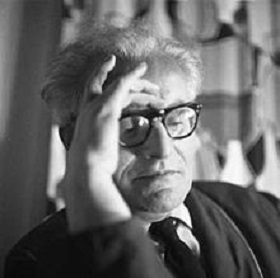
Jac. van Hattum (10 februari 1900 – 19 augustus 1981)
De Duitse schrijfster Simone Trieder werd geboren op 10 februari 1959 in Quedlinburg. Zie ook alle tags voor Simone Trieder op dit blog.
Uit:Mein Herz knistert auf Papier
“ich, manon, habe ein geometrieheft geopfert, das fach haben wir in diesem schuljahr nicht mehr. natürlich habe ich den überflüssigen geo-metrieteil schön entfernt, der rest gehört dir und deinem schweren schicksal. stubenarrest! was für eine widerlich altmodische veranstaltung! schon das wort »stube«, das ist doch total ver-staubt, oder? diese erziehungsmethode gehört nun wirklich nicht mehr ins dritte jahrtausend. und handy und laptop haben sie dir auch wegge-nommen. mann! das ist doch pädagogisch unter aller sau, sag ihnen das mal.
wir sitzen hier im »urknall«, du weißt schon, und versuchen uns vorzustellen, was du machst. här-ter hätten dich deine eltern nicht bestrafen kön-nen! und das dafür, dass wir gestern ein wenig die zeit überzogen haben. hast du deinen leuten auch gesagt, weshalb? schließlich ging es nicht um irgendwelchen quark, sondern um den 17. jahrestag einer legendären verlobung.“
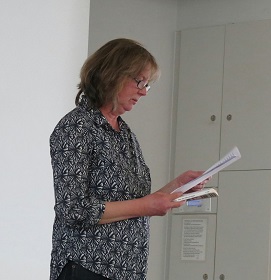
Simone Trieder (Quedlinburg, 10 februari 1959)
De Duitse dichter en schrijver Bertolt Brecht werd op 10 februari 1898 in de Zuid-Duitse stad Augsburg geboren. Zie ook alle tags voor Bertolt Brecht op dit blog.
Uit: Mutter Courage und ihre Kinder
„Der Feldwebel: Man merkts, hier ist zu lang kein Krieg gewesen. Wo soll da Moral herkommen, frag ich? Frieden, das ist nur Schlamperei, erst der Krieg schafft Ordnung. Die Menschheit schießt ins Kraut im Frieden. Mit Mensch und Vieh wird herumgesaut, als wärs gar nix. Jeder frißt, was er will, einen Ranken Käs aufs Weißbrot und dann noch eine Scheibe Speck auf den Käs. Wie viele junge Leut und gute Gäul diese Stadt da vorn hat, weiß kein Mensch, es ist niemals gezählt worden. Ich bin in Gegenden gekommen, wo kein Krieg war vielleicht siebzig Jahr, da hatten die Leut überhaupt noch keine Namen, die kannten sich selber nicht. Nur wo Krieg ist, gibts ordentliche Listen und Registraturen, kommt das Schuhzeug in Ballen und das Korn in Sack, wird Mensch und Vieh sauber gezählt und weggebracht, weil man eben weiß: Ohne Ordnung kein Krieg!
Der Werber: Wie richtig das ist!
Der Feldwebel: Wie alles Gute ist auch der Krieg am Anfang halt schwer zu machen. Wenn er dann erst floriert, ist er auch zäh; dann schrecken die Leut zurück vorm Frieden wie die Würfler vorm Aufhören, weil dann müssens zählen, was sie verloren haben. Aber zuerst schreckens zurück vorm Krieg. Er ist ihnen was Neues.
Der Werber: Du, da kommt ein Planwagen. Zwei Weiber und zwei junge Burschen. Halt die Alte auf, Feldwebel. Wenn das wieder nix ist, stell ich mich nicht weiter in den Aprilwind hin, das sag ich dir.
Man hört eine Maultrommel. Von zwei jungen Burschen gezogen, rollt ein Planwagen heran. Auf ihm sitzen Mutter Courage und ihre stumme Tochter Kattrin.
Mutter Courage: Guten Morgen, Herr Feldwebel!
Der Feldwebel sich in den Weg stellend: Guten Morgen, ihr Leut! Wer seid ihr?“
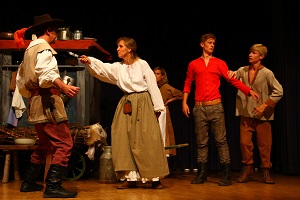
Bertolt Brecht (10 februari 1898 – 14 augustus 1956)
Scene uit een opvoering in Stuttgart, 2013
De Russische dichter en schrijver Boris Leonidovich Pasternak werd geboren in Moskou op 10 februari 1890. Zie ook alle tags voor Boris Pasternak op dit blog.
Uit: Doctor Zhivago (Vertaald door Max Hayward and Manya Harari)
“In the summer of 1903, Yura and his uncle were riding in a tarantass and pair over the fields to Duplyanka, the estate of Kologrivov, the silk manufacturer and great patron of the arts, to see Ivan Ivanovich Voskoboinikov, a pedagogue and popularizer of useful knowledge.
It was the feast of the Kazan Mother of God,3 the thick of the wheat harvest. Either because it was lunchtime or on account of the feast day, there was not a soul in the fields. The sun scorched the partly reaped strips like the half-shaven napes of prisoners. Birds circled over the fields. Its ears drooping, the wheat drew itself up straight in the total stillness or stood in shocks far off the road, where, if you stared long enough, it acquired the look of moving figures, as if land surveyors were walking along the edge of the horizon and taking notes.
"And these," Nikolai Nikolaevich asked Pavel, a handyman and watchman at the publishing house, who was sitting sideways on the box, stooping and crossing his legs, as a sign that he was not a regular coachman and driving was not his calling, "are these the landowner's or the peasants'?"
"Them's the master's," Pavel replied, lighting up, "and them there," having lighted up and inhaled, he jabbed with the butt of the whip handle towards the other side and said after a long pause, "them there's ours. Gone to sleep, eh?" he scolded the horses every so often, glancing at their tails and rumps out of the corner of his eye, like an engineer watching a pressure gauge.
But the horses pulled like all horses in the world; that is, the shaft horse ran with the innate directness of an artless nature, while the outrunner seemed to the uncomprehending to be an arrant idler, who only knew how to arch its neck like a swan and do a squatting dance to the jingling of the harness bells, which its own leaps set going. “

Boris Pasternak (10 februari 1890 - 30 mei 1960)
Cover
De Joods-Oostenrijks-Britse schrijver Jakov Lind (pseudoniem van Heinz Landwirth) werd geboren in Wenen op 10 februari 1927. Zie ook alle tags voor Jakov Lind dit blog.
Uit: Numbers; a Further Autobiography
“What do you see when you look back? Not a thing. And when you look ahead? Even less. That's right. That's how it is.
It was three o'clock in the morning and raining. The train didn't stop anywhere. There were lights somewhere in the countryside, but you couldn't be sure if they were windows or stars.
The tracks were tracks – but why shouldn't there be tracks in the clouds?
Paris was somewhere at the end of the trip. Which Paris? The earthly Paris – with cafes, green buses, fountains, and grimy whitewashed walls? Or the heavenly Paris? Carpeted bathrooms with a view of the Bois de Boulogne?
I walked up three flights, stood in front of our door and wanted to ring the bell, but what would I say this time if someone opened? I came to look at the white coal box in the kitchen? At the nymphs and fauns still over the bed? May I look for my playing cards? ... I must have died somewhere inside when I left this house in the summer of '38 and I move in an underworld now.”
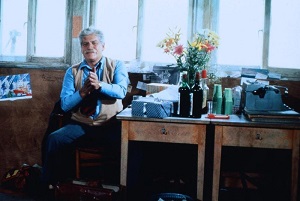
Jakov Lind (10 februari 1927 – 17 februari 2007)
Hier in de rol van Jacob in de film Das Schweigen des Dichters (1987).
De Surinaamse dichteres Carry-Ann Tjong-Ayong werd op 10 februari 1941 in Paramaribo, Suriname geboren Zie ook alle tags voor Carry-Ann Tjong-Ayong op dit blog.
Schoolherinnering
voor Cathrien in de Kruisstraat
Zie hoe ze hier nu niet meer loopt al hoor ik nog haar schoenen
zachtjes kraken op de straat
het piepen van haar fiets
die naar de Oosterhamriklaan 18 gaat
wij hebben hier in al die jaren kilometers afgelegd
zoveel gezegd wat jonge meisjes elkaar toevertrouwen
en nu als oude vrouwen zijn wij wreed uiteengescheurd
ons leven is verbeurd een pand niets waard in rimpelige handen
wij waren jong en puur en hoopvol in het morgenlicht dat zonnegoud op ons
gezicht de dagen zag ontstaan
wij zouden jaren langer leven en alles geven dat gretig onze jonge lijven bloeien deed
wij zongen van het gras dat groeide en van paarden in de wei
een zwaan die wit voorbij gleed en een regendag in mei
wat is er toch gebeurd met jou
wanneer liet je mij los? Ik zag die donkere wolk niet komen waar ik zat
jij ging me steeds vooruit
pas toen ‘t te laat was keek ik je onthutst nog na en wist ik toen
dat zeepbellen uiteen spatten als je steeds door blijft blazen
maar steeds als ik die stad door kom daar bij het Noorden of het Oosten
hoor ik je stem die vrolijk naar mij roept
ben ik het kind weer op de stoep
dat nog naar school fietst elke dag
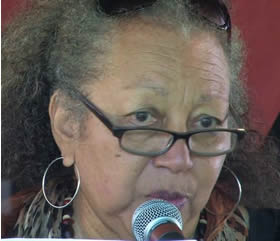
Carry-Ann Tjong-Ayong (Paramaribo, 10 februari 1941)
Zie voor nog meer schrijvers van de 10e februari ook mijn blog van 10 februari 2013 deel 2 en eveneens deel 3.
10-02-2016 om 10:53
geschreven door Romenu 
Tags:Johan Harstad, Åsne Seierstad, Marjolijn van Heemstra, Jac. van Hattum, Simone Trieder, Bertolt Brecht, Boris Pasternak, Jakov Lind, Carry-Ann Tjong-Ayong, Romenu
|

